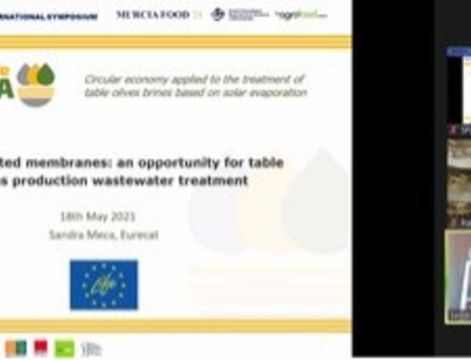
News from F&A Cluster Foundation of de Murcia Region
Food and Agriculture Cluster Foundation of de Murcia Region
The iWATERMAP project focuses on suporting the innovation policies in water technology sector, helping to increase the critical mass of innovation ecosystems in partner regions in this sector. The critical mass in innovation ecosystem approach means that all the necessary elements for innovation ecosystem are identified and put in place stage by stage, such as academia and business cooperation, cross-cluster fertilization, interregional networks and cooperation, science and education, thus ensuring stable and sustainable development of the system.
The Project has selected the water technology sector as a focus area. The importance of the sector lies in its ability to help to address societal challenges related to water resource management - water scarcity, efficiency, use in other industrial sectors, resource recovery from waste water and waste water treatment etc. The sector has a large potential for generating innovative products and services which can be exported, thus also contributing to the creation of growth and jobs in the region.
Overall Project objective is to improve innovation policies for enhancing the critical mass development of innovation ecosystems in the water technology sector. Reaching the critical mass in innovation will allow partner regions in future to rise above their own weight in innovation development, creating the conditions for raising competitiveness, growth and jobs in the regions.
Project will address 7 policy instruments by assessments, learning sessions, roadmaps, action plan development, good practice identification and sharing and involvement of regional stakeholder groups. One of its main outputs will be preparation of roadmaps (3) for reaching the critical mass in ecosystem innovation in the sector.
There are 9 partners and 7 regions participating in the Project from NL, LV, PT, ES, EL, RO and CZ, thus combining a leading regions in innovation (NL) with moderate (CZ, LV, ES, PT, EL) and modest (RO) innovators.
Read here the joined iWATERMAP assasment methodoloy
€1,687,330.00
Research and innovation
OP Noord 2014-2020, thematic objective 1, “Strengthening research, technological development and innovation” puts a strong emphasis on innovation, with 76% of the budget allocated to this thematic objective.
The OP Noord highlights specific challenges in the region Northern Netherlands and is based on the RIS3:
1) SMEs in The Northern Netherlands are mostly innovation followers. The amount of innovative SMEs in The Northern Netherlands is lower than the country average and it is hard to create new innovation leaders.
2) The specific bottleneck for the innovation system in Northern Netherlands - in the field of human capital - concerns the availability of sufficiently skilled and specialized staff for the northern business community.
However, the OP Noord needs to be improved because it takes the overall conditions existing in the region as a given and is not ambitious enough in making a difference. On one hand, the programme targets mostly individual SMEs of any economic sector. Rather than concentrating funding on chosen economic areas, the calls so far intended to sprinkle the ERDF funding widely rather than focusing on key sectors. Secondly, the current approach is also not met with particular success as the absorption rate is still very low.
To better match the identified needs and strengths in the region the OP should therefore support the creation and growth of new innovation leaders, and improve the conditions for human capital development in the region.
OP in general aims to achieve key national development priorities along with the EU2020 objectives.
TO 1 specific objectives No 1.1.1 “Enhanced capacity of scientific institutions of Latvia to conduct research and contribute to innovation, as well as attract external funding and invest in human resources and infrastructure” and No 1.2.2. “To facilitate development of innovative and technology intensive entrepreneurs” are developed to support the implementation of RIS3. Water sector as thematic area is interdisciplinary and corresponds to all five LV RIS3 specialization areas. Specific water sector related issues to ensure sustainable water management through new technologies and innovation are supported from structural funds.
Challenges:
- Institutions implementing projects in new water technologies are dealing with barriers in introducing technology in real circumstances. Popularization of research achievements in this field would help to overcome these barriers.
-Understanding the “demonstration beforehand” process is necessary in order to plan and introduce new technology; this mechanism should be intended and planned in the policy to speed up the cooperation between scientists and technology producers.
-Additional investments in human capital. Now in the OP the main planned activities are trainings of municipality experts, but there is a lack of funding for educating final users, as well as scientists and decision-makers using real functioning technologies.
Crete OP is one of the 13 multisectoral and multifunded Regional Operational Programmes (ROP) in Greece. The aim of the OP is to strengthen the capacity of the region and local authorities. The Crete OP is in line with the EU 2020 targets, Smart Specialization Strategy RIS Crete, Climate Change Adaptation Strategy. In the project, Crete will focus on TO "Boosting Research, Technological Development and Innovation in combination with TO “Sustainable development with environmental upgrade and climate change adaptations“. Investments on water sustainable management actions are estimated to reach 18% of the overall funding. In the RIS Crete, the environmental complex has been prioritised within the regional innovation system. The focus is on water resources, innovation in water management and
tackling of climate change consequences. The fact that Crete has a developed primary sector and is a major touristic destination, has effect of jeopardising its natural resources sustainability especially under the auspices of climate change. On the other hand Crete is characterized by the presence of an internationally acclaimed educational and research potential which could develop and disseminate innovations in many sectors. Our aim is to promote the effectiveness of our policy instrument by seeking collaboration and exchange of good practices as well as new investment tools in an effort to confront the pressure on the water resources of the island.
ROP is managed by the Ministry of Regional Development, Public Administration and European Funds (MRDPAEF) as MA. Through Priority Axis 1 - Promoting technology transfer, ROP allocates to NE Region EUR 36.15 mil for the implementation of investments on development of infrastructures and technological transfer (TT) services. To program resources, MA recommended to Romanian regions to develop a Regional Framework Document for Smart Specialization. This was developed by NE RDA in partnership with academia, R&D institutes, business and public sector. Access to these funds is conditioned by submission of Letters of Intention (LI) through which potential beneficiaries present the experience, the vision, the competitive advantages, the functional mechanisms, the assets and the abilities existing or created in order to develop the TT activities. A Regional Innovation Consortium and an Academic Advisory Committee have been set up regionally for analysing the 36 LIs already submitted in view of submitting relevant projects. To ensure the effectiveness of the ROP it is necessary to create new/further develop the existing TT entities as intermediates between innovation demand and diversified supply of research results. Given the importance of the water value chain, which has been identified as one of the key issues for the region, it is important to foster the innovation chain particular in the water technology sector, supporting growth and unlocking other economic potential.
Norte 2020 is the regional operational programme (ROP) for North Portugal.
This project is aligned with the NORTE 2020 priority axis 1, that intends for Research, Development and Technological Innovation (R&D&TI), and specifically the Priority Investment 1.2 that aims at increasing investment in R&D&TI by companies, strengthening the link between businesses and the regional science and technology system , and promoting an increase in knowledge-intensive economic activities, as well as the creation of value based on innovation.
The ROP supports several aspects related to innovation delivery and puts emphasis on internationalisation (specific objectives 1.2.3 and 1.2.4). There is a particular focus on the agri-food sector, as one of the smart specialisation areas. So far, the funds are mainly used for product innovation and less for process innovation that contribute to circular economy. However, the water sector is heavily impacted by the agri-food sector (lack of treatment of wastewater, nutrients from agriculture that enter the groundwater). A one-sided focus on innovation in new products (e.g. based on wine and dairy products, which are important in the North of Portugal) and the sale process rather than a circular economy oriented and sustainable production process hampers the long-term sustainable development of the region. It is therefore necessary that the ROP more actively fosters initiatives which focuses on water cycle innovation within the agri-food sector.
Regional Operational Programme 2014-2020 for the Murcia Region. Measures 01-1b
Measure 1b focuses on the development of links and synergies between enterprises, research and development centres and the higher education sector. It promotes among others eco-innovation and public private partnerships.
At the same time, water management has been identified as a key issue for the region (RIS3), as the Region of Murcia is suffering an important scarcity of water which is conditioning the most of their industrial activities.
The region aims to reduce the consumption of water by 10 % without reducing the irrigation surface because of the agricultural activity is developed in rural areas with very few industrial possibilities.
It is therefore particularly important to foster innovation and the innovation chain (cooperation between enterprises and research) in the water sector, helping the local companies to stay competitive and to be able to cope with the scare resources. The policy instrument should therefore better address this particular field, making it easier for related initiatives to access funding. For example, water reuse and wastewater treatment plants as well as the modernisation of irrigation systems should be tackled. This could for example be through targeted calls or improved support for such initiatives or also revised selection criteria and specific priority areas, that address particularly water management issues.
The update of the Strategic Vision of the Development Strategy for the SM Region 2020 follows the strategic documents of the EU, the Regional Development Strategy for Czech Republic and the Development Strategy of the SM Region 2006-2016. It creates a general framework for Regional Development Program and other regional concepts and strategic documents. It’s a strategic document outlining priorities and future interventions for SM with 4 main priority axes:
1. Competitive regional economy on European/global scale
2. Adequate and high quality public service offer
3. The development of core infrastructure and transport links
4. Long term viability of the disadvantaged parts of the region
The main focus will be on priorities 1 and 3. Under point 3, water management issues are covered. Although general issues with regard to water management are outlined in the instrument, such as the importance for sustainable water supply, concrete and effective action proposals are missing. In particular, it is the innovation chain – good cooperation between research and industry – that needs to be better addressed to provide efficient solutions. This in turn is an important focus of point 1. Water technology has good potential to contribute to regional development, but for this innovation chain needs to be improved. This means that the relevant stakeholders need to be better involved in the development of the strategy and the decision-making process to ensure a functioning innovation chain.

Food and Agriculture Cluster Foundation of de Murcia Region
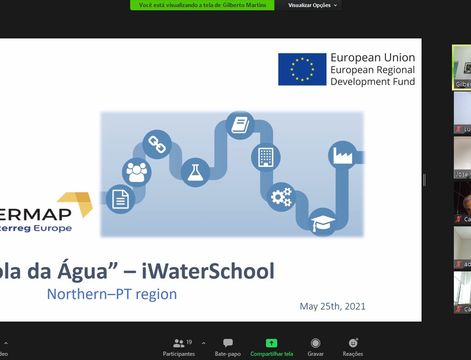
Regional stakeholders meeting – “Escola da Água” – iWaterSchool – Northern-PT region
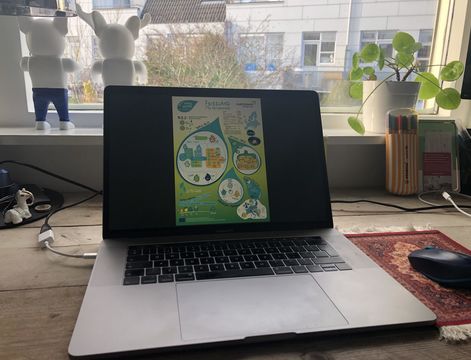
The assessments of the current practices of the water technology sector are ready
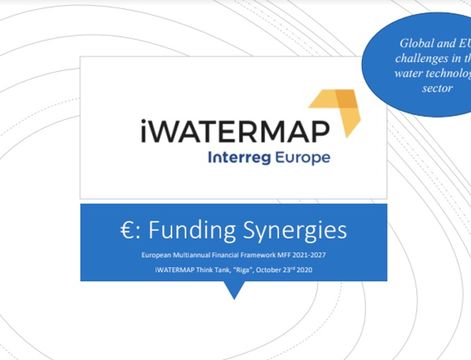
On October 23 representatives of the Ministry of Education and Science of Latvia in cooperation with members of Riga Technical University Water research and bio
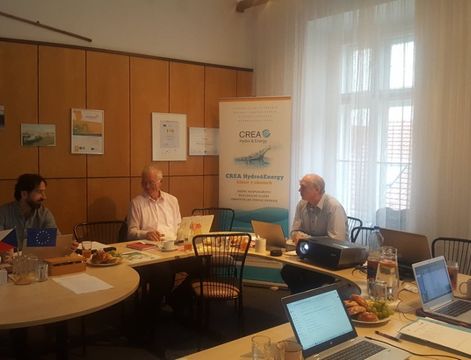
The iWATERMAP project from the INTERREG EUROPE program ends the 5th semester of its implementation

Innovations and Water management projects of the South Moravian Region
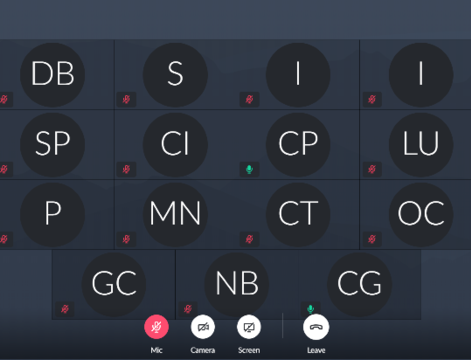
The stakeholder consultation seminar within the iWATERMAP project, that took place online...
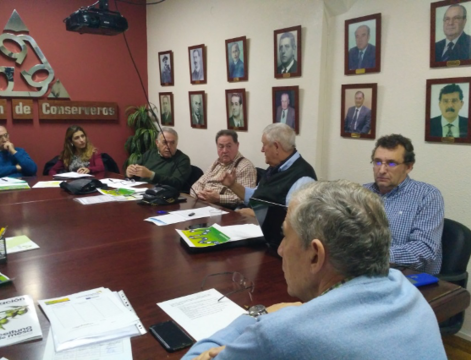
A meeting with stakeholders from universities, research centers, company’s advisers in the agri-food....

Sustainable water management is essential for key sectors in Europe, such as tourism, agriculture, energy,

Third semester of the iWATERMAP project was concluded by regional stakeholder meeting in our region at the end of November.